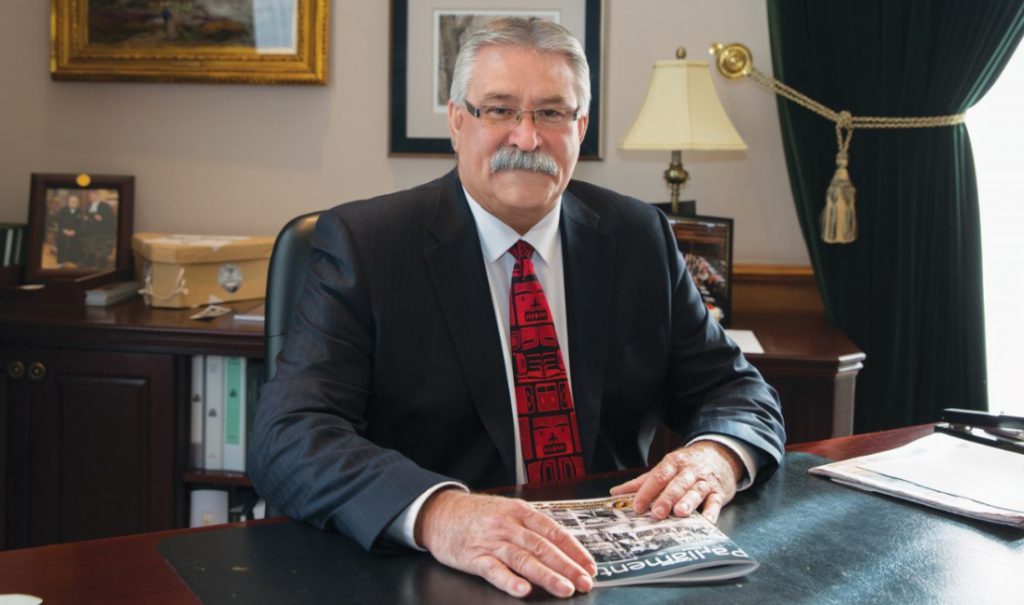Dave Levac puts the politics in political science

"Textbooks are good, but there’s nothing like experiencing it yourself," retired Brant MPP Dave Levac says. The former speaker of Ontario's legislature will give McMaster political science students a very real look at politics this fall. Photo courtesy of Dave Levac
Dave Levac is about to spend a semester reliving one of the most challenging periods of his career.
In September 2012, the fallout from a controversial decision on gas-powered hydro plants was threatening Ontario’s minority Liberal government. As speaker of the legislature, Levac had to rule on whether the energy minister — a colleague from his own caucus — had committed a breach of a privilege by withholding documents from the opposition.
“It was a turning point, I think, for the government of the day,” Levac recalls. “but my decision was clear: I had to rule against the party I came from.”
It was a time of immense pressure and fierce scrutiny.
“That ruling was a test of my integrity, and my honesty,” he remembers. “Those are the moments that test you as an individual, and as a parliamentarian.”
And those are the moments he wants students of politics to understand.
Levac, who retired in May after 19 years as the MPP for Brant, is joining McMaster as the Distinguished Visiting Professor in Public Leadership for Change, a position created through the Socrates Project, a campus-wide pilot that strengthens McMaster’s commitment to the liberal arts.
Levac will teach POLSCI 4ZZ6, a fourth-year political science research course that focuses heavily on experiential learning: The class will visit Queen’s Park, meet politicians and their staff, and learn how to create a case study using Levac’s own experience as speaker during the gas-plants controversy.
“They’ll study Hansard and other records of parliamentary business, and read all the rigmarole that went on during that time, digest it and see whether the speaker made the right choice.”
He waits a beat, then deadpans: “They better say he did, or no passing mark!”
In the winter term, students will use those insights and resources to choose topics on which to create their own case studies.
“At the end of the year, they will have produced case studies on file for the Socrates project and McMaster to use on studies of the legislature and the political process,” Levac says.
More importantly to him, students will get a unique, real-world insight into the dynamics of politics and law-making, a marked departure from what they get from textbooks or news coverage.
“I want my students to get a feel for the real meat and potatoes of politics, versus a storybook or horror story or cynical vision of it,” he says.
“We’re living in an era of an extremely cynical view of politics and the people in it. I’m prepared to share stories from the inside that bust that bubble up a bit.”
It’s time to put Levac’s brand of public leadership back on the agenda, political science chair Karen Bird says.
“Dave is exceptionally well qualified to inform and inspire our students in the art and method of good leadership — a practice that requires listening to all sides, balancing short and long-term interests, and rising above an increasingly polarized political climate,” she says.
“It is when the stakes of the political game are at their highest that we see most clearly what a difference enlightened leadership makes, along with responsible governance and accountability.”
Socrates director Rina Fraticelli agrees. “Thoughtful, public-spirited leadership — which Dave Levac exemplifies — goes to the heart of the mission of the Socrates Project,” she says. “Today’s McMaster students are tomorrow’s leaders. We want to provide them with the kind of inspiration and critical thinking that a mentor like Dave can offer to explore ways in which we can have productive disagreements about the kinds of issues which too often divide us.”
Levac, who was a school principal before he ran for office in 1999, says he never lost his love of teaching. As speaker, he arranged to visit communities around the province with the local MPP — regardless of party affiliation — to talk to residents about how the legislature works.
“That was kind of a joy for me,” he says. “I didn’t want to lose that classroom feeling.”
So when Bird approached him about the visiting professorship, it wasn’t a tough sell.
“I have a lot of time for Karen’s vision, and for the Socrates Project,” Levac says.
“I don’t know what the future will bring, but I can tell you if it does close to what Karen is hoping, McMaster will be a leader in how we look at the delivery of political science. I’m quite impressed with what it has the potential to do.”


